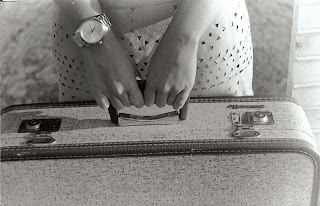What is so important about the look? Why is it the climax of the story (both original myth and play)?
A: Everything depends on that moment; it's truly a moment between and life and death.
K: When Orpheus turns and looks at Eurydice he kind of seals their fate. The Major Dramatic question is settled, he's not going to get her back. She's gone forever.
Why do you think Orpheus looks in the original myth?
A: In the original myth, Orpheus looks back because he is unsure and he doesn't trust that Eurydice is behind him.
K: To me the Greek myth portrays Orpheus' glance as coming from a place of desire, or impatience. As if he simply couldn't wait another second to see her.
Why do you think Eurydice initiates the look in the play?
K: Something that interests me in understanding their relationship is the fact that Eurydice's father died, and Orpheus never knew him. I think that can be difficult for a young man. It's almost as if he's responsible to fill two roles. I think Eurydice initiates the look because she wanted to go back to her father. It's a sudden decision, the kind of decision that is made all at once.
What makes Orpheus and Eurydice’s relationship wonderful? What makes it complex?
A: What makes Orpheus and Eurydice's relationship wonderful is also what it makes it complex: they are opposite in many ways. Their different interests complement each other and that's what they love about each other, but these same differences sometimes causes tension between them.
K: I think their are some very good things going on in their relationship. Something that interests me is how well they know each other. Orpheus says that they've, "known each other for centuries." He knows how much she hates oatmeal, she her last letter to him demonstrates a mature relationship. When it comes down to it, I think that their marriage could have worked. They simply made the wrong mistakes at the wrong time.
As an actor, what has been your biggest challenge regarding this relationship?
A: The biggest challenge has been understanding how to portray the complexity of their relationship. At first the relationship was very 'lovey dovey' and superficial, but over the rehearsal process it became deeper and more mature.
K: My biggest challenge has been connecting with the emotions associated with loss. It's hard to accurately reflect what a person goes through in these kind of situations. Luckily though, I don't think accuracy is the most important element. I feel that audience members will contribute enough in thinking of their own losses. Still, to open up and be completely vulnerable on stage is always one of the biggest challenges.
Any other thoughts about your characters that you’d like to share?
K: I'm also interested in Orpheus' relationship to music. It's fun to see Orpheus and Eurydice so in love, but they don't necessarily like the same things. They want each other to be able to appreciate and engage with the things that interest them.



































